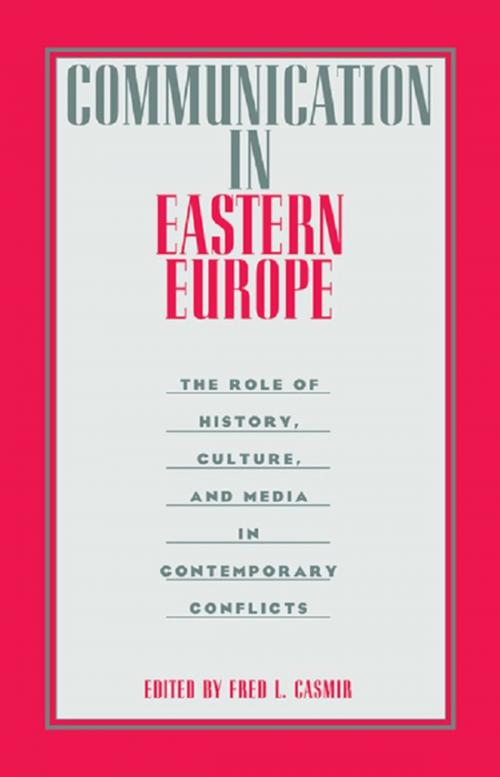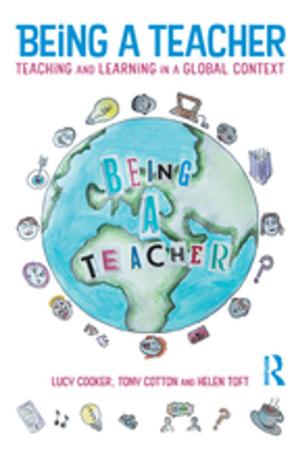Communication in Eastern Europe
The Role of History, Culture, and Media in Contemporary Conflicts
Nonfiction, Reference & Language, Language Arts, Communication| Author: | ISBN: | 9781136484704 | |
| Publisher: | Taylor and Francis | Publication: | December 6, 2012 |
| Imprint: | Routledge | Language: | English |
| Author: | |
| ISBN: | 9781136484704 |
| Publisher: | Taylor and Francis |
| Publication: | December 6, 2012 |
| Imprint: | Routledge |
| Language: | English |
This volume represents a clear attempt to learn something from the events in Eastern European countries. It does not start with simplistic or old assumptions based on convenient Western communication models, but instead takes a new approach. If chaos theory could fundamentally change how physicists looked at order in the universe, then it may be of value for communication scholars to attempt to understand the diversity of chaos or order in the human universe, rather than attempt to force existing models on it for their own explanatory purposes.
This book is not merely based on the study of select groups of university students or on laboratory settings created in the minds of social scientists. It seeks to understand some of the "real world," including the historical backgrounds and the theoretical assumptions brought to studies of intercultural conflicts. Using personal and professional insights developed during firsthand contacts with existing situations, chapter authors illustrate some of the realities by using the complexity of changes in Eastern European states during the final decade of the 20th century. From education to business, from the role of women to the role of mass media, from the impact of political systems to the impact of history, communication between those who are culturally diverse, though they may have been arbitrarily forced to live under the same "political roof," is the theme of these scholarly studies.
The editor's reason for developing this volume of original essays is his belief that diversity rather than assumed similarity or even sameness -- based on the use of inadequate terminology -- is necessary for learning from contemporary human experiences. He further believes that diversity and the significant roles of cultural values as well as of history need to become key concepts in the model with which to begin when it comes to the study of various aspects of intercultural communication. It is therefore vital that scholars who represent various points of view and backgrounds contribute to that process. After all, understanding what is happening in the world is centrally anchored in or related to effective and successful "intercultural" communication between scholars who have different academic and personal backgrounds.
This volume represents a clear attempt to learn something from the events in Eastern European countries. It does not start with simplistic or old assumptions based on convenient Western communication models, but instead takes a new approach. If chaos theory could fundamentally change how physicists looked at order in the universe, then it may be of value for communication scholars to attempt to understand the diversity of chaos or order in the human universe, rather than attempt to force existing models on it for their own explanatory purposes.
This book is not merely based on the study of select groups of university students or on laboratory settings created in the minds of social scientists. It seeks to understand some of the "real world," including the historical backgrounds and the theoretical assumptions brought to studies of intercultural conflicts. Using personal and professional insights developed during firsthand contacts with existing situations, chapter authors illustrate some of the realities by using the complexity of changes in Eastern European states during the final decade of the 20th century. From education to business, from the role of women to the role of mass media, from the impact of political systems to the impact of history, communication between those who are culturally diverse, though they may have been arbitrarily forced to live under the same "political roof," is the theme of these scholarly studies.
The editor's reason for developing this volume of original essays is his belief that diversity rather than assumed similarity or even sameness -- based on the use of inadequate terminology -- is necessary for learning from contemporary human experiences. He further believes that diversity and the significant roles of cultural values as well as of history need to become key concepts in the model with which to begin when it comes to the study of various aspects of intercultural communication. It is therefore vital that scholars who represent various points of view and backgrounds contribute to that process. After all, understanding what is happening in the world is centrally anchored in or related to effective and successful "intercultural" communication between scholars who have different academic and personal backgrounds.















